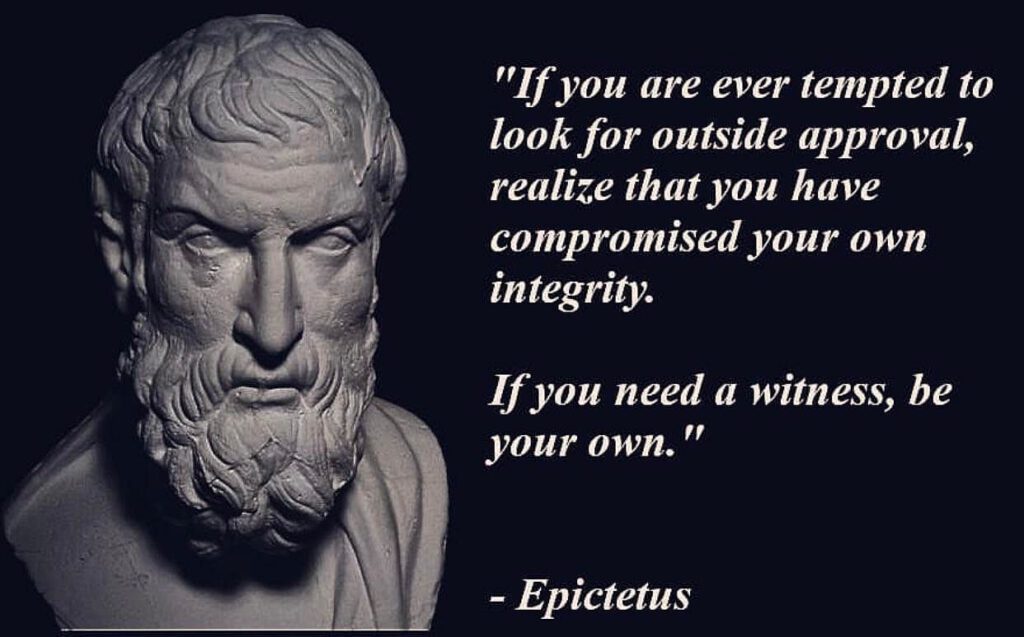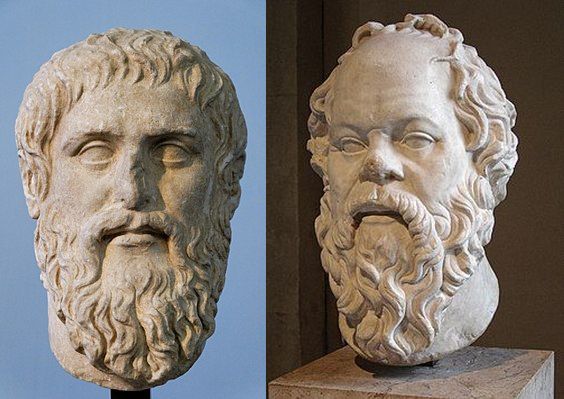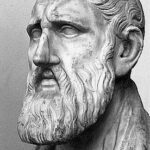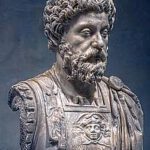De stoïcijnse filosofie ligt aan de basis van de beste moderne zelfhulpbenaderingen, zoals rationeel-emotieve therapie, cognitieve gedragstherapie en positieve psychologie.
In mijn bibliotheek bevinden zich twee oude boeken die voor mij de nuttigste zelfhulpboeken van allemaal zijn: Het Handboek van Epictetus (55-135) en De Meditaties van Marcus Aurelius (121-180).
Stoïcijns
Epictetus en Marcus Aurelius zijn pijlers van de stoïcijnse filosofische school.
Stoïcisme betekent niet dat we ons minder zorgen maken en emoties onderdrukken of plezier mijden, maar dat we ons concentreren op wat in onze macht ligt en alles loslaten waar we geen controle over hebben. Dit is wat Marcus zei, gebaseerd op de leringen van Epictetus:
Om uw ervaring te veranderen, moet u uw mening veranderen. Als je van streek bent door iets buiten jou, is het niet het ding zelf dat je van streek maakt, maar jouw mening erover. En het ligt in jouw macht om die mening onmiddellijk weg te vagen.
Klinkt als advies van Albert Ellis, die in 1957 Rational Emotive (Gedrags) Therapie (RE(B)T) oprichtte. Om eerlijk te zijn: Ellis gaf Epictetus de eer om een basis te leggen voor zijn systeem van psychotherapie.
De dagboeknotities van Marcus Aurelius zijn precies dat: aantekeningen voor hemzelf. In een van de eerste vermeldingen in Boek I bedankt hij zijn leraar Rusticus voor de kennismaking met het werk van Epictetus. Deze filosoof is dus de eerste die onze aandacht behoeft. In een volgend bericht zullen we het hebben over Marcus Aurelius.
Epictetus
Epictetus was een Griekse stoïcijnse filosoof. Hij werd geboren in Hierapolis, Frygië (het huidige Pamukkale, Turkije) en bracht zijn jeugd door als slaaf in Rome van Epafroditos, een rijke vrijgelatene en secretaris van Nero. Epictetus verwierf al vroeg in zijn leven een passie voor filosofie en, met toestemming van zijn rijke eigenaar, studeerde hij stoïcijnse filosofie onder Musonius Rufus. Door op deze manier beter opgeleid te worden, verhoogde zijn sociale status. Op een gegeven moment raakte hij kreupel. Origenes schreef dat dit kwam doordat zijn been opzettelijk door zijn eigenaar was gebroken.
Simplicius schreef daarentegen dat hij van kinds af aan gewoon kreupel was geweest. ‘kreupelheid is een belemmering voor het been,’ zou hij later zeggen, ‘maar niet voor de wil.’
Epictetus verkreeg zijn vrijheid enige tijd na de dood van Nero in 68 n.Chr., en hij begon filosofie te onderwijzen in Rome. Rond het jaar 89, toen keizer Domitianus alle filosofen uit de stad wilde verbannen, verhuisde Epictetus naar Nicopolis in Epirus, Griekenland, waar hij een filosofische school oprichtte.
Epictetus leefde alleen, met weinig bezittingen. Maar op zijn oude dag adopteerde hij het kind van een vriend, dat anders zou zijn achtergelaten om te sterven, en voedde hem op met de hulp van een vrouw. Hij stierf ergens rond het jaar 135.

Arrianus
Zijn beroemdste leerling, Arrianus, studeerde als jonge man onder hem (rond 108 n.Chr.) en beweerde zijn beroemde verhandelingen te hebben geschreven op basis van de aantekeningen die hij maakte over de lezingen van Epictetus.
Hij schreef acht boeken over deze kwestie, maar er zijn er slechts vier bewaard gebleven.
Enchiridion
Arrian stelde ook een populair overzicht samen, getiteld de Enchiridion, of Handboek. In een voorwoord bij de Verhandelingen, gericht aan Lucius Gellius, stelt Arrianus dat ‘wat ik hem (Epictetus) ook hoorde zeggen, ik zo goed mogelijk woord voor woord opschreef, in een poging het als een gedenkteken te bewaren, want mijn eigen toekomstige gebruik, van zijn manier van denken en de openhartigheid van zijn toespraak‘.
Arrianus voerde aan dat zijn verhandelingen als vergelijkbaar met de socratische literatuur moesten worden beschouwd. Arrianus beschreef Epictetus als een krachtige spreker die ‘zijn luisteraar ertoe kon brengen precies te voelen wat Epictetus wilde dat hij voelde‘.
Veel vooraanstaande figuren zochten gesprekken met hem. Keizer Hadrianus was bevriend met hem en heeft hem misschien op zijn school in Nicopolis horen spreken.
De filosofie van Epictetus
Epictetus leerde dat filosofie een manier van leven is en niet alleen een theoretische discipline. Voor Epictetus liggen alle externe gebeurtenissen buiten onze controle; we moeten alles wat er gebeurt kalm en emotieloos accepteren. Individuen zijn echter verantwoordelijk voor hun eigen daden, die ze kunnen onderzoeken en controleren door middel van strenge zelfdiscipline.
Zowel de Verhandelingen als het Handboek beginnen met het maken van onderscheid tussen de dingen die in onze macht liggen (prohairetische dingen) en de dingen die niet in onze macht liggen (aprohairetische dingen).
“We hebben geen macht over externe dingen, en het goede dat het voorwerp zou moeten zijn van ons oprechte streven, kan alleen in onszelf worden gevonden.”
Dit is vergelijkbaar met Shakespeare’s “Er is niets goed of slecht, maar het denken maakt het zo.” (Hamlet: Act 2, Scene 2), en John Milton’s “De geest is zijn eigen plaats, en kan op zichzelf een hemel van de hel maken, een hel van de hemel.”
Er is terecht gezegd dat, hoewel Epictetus een stoïcijn wordt genoemd en dat zijn principes stoïcijns zijn, hij niet louter een stoïcijn is. Hij leerde zowel van andere leraren als van de stoïcijnen. Hij citeert voortdurend de leer en het voorbeeld van Socrates (470-390 voor Christus), en het voorbeeld van Diogenes de Cynicus (404-323 voor Christus), die hij beide vaker noemt dan Zeno (490-430 voor Christus), de grondlegger van de stoïcijnse filosofie. Hij waardeerde ook Plato (427-347 voor Christus), die veel van zijn principes van Socrates overnam, ontwikkelde en uitbreidde.

Epictetus verzet zich krachtig tegen de leringen van Epicurus, van de nieuwere academici, en van Pyrrho, de grote leider van de sceptische school.

